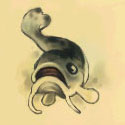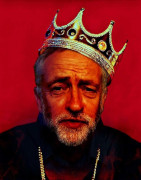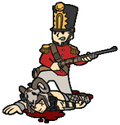|
HEY GAL posted:This flag and its associated meanings just keep getting better.
|
|
|
|

|
| # ? May 26, 2024 22:04 |
|
The similarities are obvious. 
|
|
|
|
HEY GAL posted:German says covered with, Latin says enfolded in. (Or "roll along in" Not to mention that they could be using virtue in the same sense that Machiavelli used Virtu, making it a pretty great motto.
|
|
|
|
"Ich bedecke mich mit meiner Tugend" is pretty obvious.
|
|
|
|
I'm sorry, but what is Tank Destroyer Doctrine and why is it supposed avoided? Is is that thing were "Shermans were for infantry supports and TDs had to fight tanks" that sometimes crop up in "Best Tank of WWII" discussions/dick measuring contests/slavboo vs. nazi all out fights?
|
|
|
|
Yes, pretty much
|
|
|
|
I am reconstructing a merchant ship (digital) build in 1939 sunk in 1941 by German bombers. The name is Thistlegorm. It is a very famous ship for scuba divers like me. We had a million questions about this ship so I started to reconstruct it. Each topic answers some of the questions but it usual raises some new ones also. I am now looking at the Paravanes of this ship. I think it was carrying Vickers or the T-type ones. Not the Otter type. I have the ship drawings also the drawings of the sister ships. Hopefully there are some Goons with the know how that can help me out a bit. http://www.shipsnostalgia.com/attachment.php?attachmentid=37803&d=1380714089 Orions Lord fucked around with this message at 09:58 on Nov 18, 2014 |
|
|
|
JcDent posted:I'm sorry, but what is Tank Destroyer Doctrine and why is it supposed avoided? Is is that thing were "Shermans were for infantry supports and TDs had to fight tanks" that sometimes crop up in "Best Tank of WWII" discussions/dick measuring contests/slavboo vs. nazi all out fights? Yes. Based on what the Americans learned (perceived?) of German strategy from 1939-1941, they expected that they would have to deal with large-scale armored breakthroughs by Panzers. The idea was that you'd have lightly armored Tank Destroyers to counter German armored thrusts, using their speed to move to where they were needed as well as to make up for their lack of armor through maneuver. It didn't work insofar as the Germans never really mounted attacks on the scale that they were expected to, especially since they were already on the defensive from 1943 onwards, on top of the difficulty of getting your special tanks to do a special duty to the right place at the right time, and that the assumptions regarding speed vs armor not really holding up in practice.
|
|
|
|
gradenko_2000 posted:Yes. It's a deeper fallacy than that - TD doctrine was based on the assumption of German success being about massed tank attacks, when really a Panzer division was all about making the Tank the primary component of a combined-arms force that had solidly integrated mechanized infantry, recon, and mobile artillery components (ideally co-coordinating with an airforce orientated towards interdiction and CAS). The idea that a bunch of independent tank-hunting battalions were an appropriate response to a Panzer offensive was terribly misguided.
|
|
|
|
JcDent posted:I'm sorry, but what is Tank Destroyer Doctrine and why is it supposed avoided? Is is that thing were "Shermans were for infantry supports and TDs had to fight tanks" that sometimes crop up in "Best Tank of WWII" discussions/dick measuring contests/slavboo vs. nazi all out fights? Aside from what everyone else said, the reason why it's supposed to be avoided is because arguments about the doctrine tended to flare up periodically in the last thread, and every time they did so they dominated the thread. So you'd be going along having an educational little sit-down about the Franco-Prussian War, and then somehow somebody brings up tank destroyer doctrine and then ho for yet another dozen pages about Wolverines and Shermans and General McNair. Speaking of the Franco-Prussian War, does anyone here know more about it? My knowledge is pretty sketchy at best, and goes something like "Bismarck tricks Prussia into thinking the French insulted them, the two armies meet up and the Germans deliver an unceremonious curbstomping, Napoleon III shames his uncle by getting captured, and then the Germans all draw swords at Versailles. Also something about Paris deciding to try and fight the war by itself." In particular, I'm curious about how and why the Germans won, and whether the French ever had a realistic chance of victory in retrospect. Were the French simply too outclassed where it mattered to have pulled out a victory, or did they just get spectacularly unlucky or make spectacularly poor decisions?
|
|
|
|
HEY GAL posted:The similarities are obvious. I know you have answered this before, and I failed to save the response. What would be a good book on your period? This thread has only made me realize how little I really know about it. I know you mentioned any book on the period ends up complex, that's not an issue.
|
|
|
|
Tomn posted:Aside from what everyone else said, the reason why it's supposed to be avoided is because arguments about the doctrine tended to flare up periodically in the last thread, and every time they did so they dominated the thread. So you'd be going along having an educational little sit-down about the Franco-Prussian War, and then somehow somebody brings up tank destroyer doctrine and then ho for yet another dozen pages about Wolverines and Shermans and General McNair. I got into this a little in the last thread but I'll see if I can get something posted about it this afternoon.
|
|
|
|
I think my favorite bit about that war is the Prussians beating the French field armies and getting stuck harvesting French crops to feed themselves while sieging.
|
|
|
|
Tomn posted:Also something about Paris deciding to try and fight the war by itself." Actually, it was more like Paris decided that this whole Napoleon Jr. thing wasn't working out and decided to rise up and institute a glorious, vaguely leftish, not-Napoleon themed government. Bismark (whose troops were cordoning the remnants of the French armies away from Paris, was like, whoa, we came here to kick rear end and take names, not help the French institute a glorious socialist paradise, and so he let the French army come in and put the Paris Commune down.
|
|
|
|
JcDent posted:I'm sorry, but what is Tank Destroyer Doctrine and why is it supposed avoided? Is is that thing were "Shermans were for infantry supports and TDs had to fight tanks" that sometimes crop up in "Best Tank of WWII" discussions/dick measuring contests/slavboo vs. nazi all out fights? Part of it is that there was no "Tanks don't fight tanks" bit that is often cited as part of the doctrine, usually as part of an attack on the M4. Tanks always had the role of supporting infantry. While that mainly involved shooting at enemy infantry and fortifications, they were provided with ammo to engage enemy armor when necessary. The TDs were supposed to replace regular AT guns and were trained to fight tanks specifically, though in practice they often did the same thing the tanks were doing. On rare occasion the TDs did actually get to perform their intended role and they were rather good at it, but overall it was a wasteful division of resources. Hence why the Tank Destroyers have been referred to as a successful bad decision.
|
|
|
|
JcDent posted:I'm sorry, but what is Tank Destroyer Doctrine and why is it supposed avoided? Is is that thing were "Shermans were for infantry supports and TDs had to fight tanks" that sometimes crop up in "Best Tank of WWII" discussions/dick measuring contests/slavboo vs. nazi all out fights? It is that thing, yes. People that don't know any better use it an an argument to claim that the Sherman sucks and Tigers/Panthers rock, ignoring the fact that the US armoured manual included protection of light tanks from enemy tanks in the duties of a medium tank, a task which even 75 mm armed Shermans were good at. It's a perfectly legitimate conversation, but the topic pops up very frequently and goes through the same lines every time, to the point where there is literally a bingo card for these things.
|
|
|
|
I just realised the parallel between the Franco-Prussian war and the first world war. Both winning sides were quick to release all of their POWs to help the other side beat a socialist revolution. Separately, though I always hear about the stab in the back myth as German army commanders using it to justify why they lost, and thus leads to rise of Hitler, isn't a huge rebellion by sailors, joined by crowds and some of the soldiers sent to put them down, pretty likely to lead to the end of the war? I am a little murky about the timing, but it kind of seems like that would be a thing (that they were defeated in the field) promoted by the Entente, both to justify the war to their citizens as well as not having to explain that the war was stopped by leftist agitators.
|
|
|
|
OneTruePecos posted:The best part about that is that it has wrapped back around to being a boutique item, so that outside NO Cafe du Monde style coffee, aka "50% chicory filler because we have to get costs down and hey at least it's not dirt", goes for like double the price of 100% Colombian. It always entertains me how these things swing around: Lobster used to be poor people/prison food.
|
|
|
|
Rhymenoserous posted:It always entertains me how these things swing around: Lobster used to be poor people/prison food. Why do ocean roaches taste so much better than their landbound brethren?
|
|
|
|
MrYenko posted:Why do ocean roaches taste so much better than their landbound brethren? Butter.
|
|
|
|
Rhymenoserous posted:It always entertains me how these things swing around: Lobster used to be poor people/prison food. Same with brown bread (white bread was considered "more pure" and more appropriate for rich people until the 1800s or so) and boulliabaisse (used to be a way for French fishermen to eat their bycatch that usually wouldn't sell). High cuisine is weird.
|
|
|
|
until the 1800s? Try until the 2000s.
|
|
|
|
Ardent Communist posted:I just realised the parallel between the Franco-Prussian war and the first world war. Both winning sides were quick to release all of their POWs to help the other side beat a socialist revolution. Eh, it's significantly more complex than that. Basically, the war was 100% lost by the time of the mutiny, to the point where you can almost consider it a post-war event. In terms of German politics it essentially is, although if you get really hung up on precise dates it's slightly before the end of the war. Basically everyone in Germany flat out knew the situation was mega-hosed in September/October of 1918, to the point where they're actively putting out feelers for a cease fire. The Kaiser flat out knows he's politically hosed because of how much he flogged this dog of a war domestically and has already set about putting the government on a more democratic footing than it was before, albeit still under the same general power structure that existed before the war. The best case scenario for him is that he quietly shuffles off stage right, lets another generation of the Imperial elite take over the real leadership of the nation, and grants a lot more power to the already present and functioning parliamentary system while still keeping a lot of power in the hands of the imperial family. What he's trying to do is essentially take a constitutional fall-back position that looks an awful lot like Victorian England - a much heavier emphasis on the "constitutional" bit of "constitutional monarchy" but with the monarchy still having a no bullshit say in government affairs. Part of this is bringing in Prince Maximilian as the new chancellor and stacking the cabinet pretty deep with SPD members. This is important because a governmental shift this big 100% signals to everyone that the war is basically over. Shooting is still happening, nothing has been inked yet, but this poo poo's done barring something insane like the French refusing to accept an armistice and insisting on unconditional surrender or something. It's within this context that Admiral Hipper, completely without orders of his own, loses his loving mind and orders the Imperial Navy to cast off and sail down the middle of the loving English channel for a last second dash at glory. Note that the individual sailors and soldiers in the Navy weren't particularly unpatriotic or disloyal to the Kaiser. One of the major trends post-Jutland was people trying to wrangle transfers off of the big ships that were staying bottled up for safety and onto the U-Boats and little ships that were still harassing the gently caress out of the RN in the North Sea. The officers were for the most part careerists in the most pampered of the armed forces with the strongest connections to the Kaiser, while the enlisted hadn't been attritted to the point that the other services had - it's still a very much pre-war organization made of patriotic professionals, not a bunch of unwilling conscripts with anti-royallist or socialist sympathies. On the other hand they're also not suicidal and are smart enough to see Hipper's suicidal charge for the complete and utter bullshit that it is. They mutiny, and the rest is history. The mutiny itself was entirely a military affair. If you look at the demands of the Sailors' Council it's really concentrated on military stuff, the release of prisoners, demobilization, etc. and is really lacking in overt politics. The SPD and USPD both tried to co-opt it for their own purposes, of course, which is a big part of what led to it spreading into the general 1918 revolution, but the Naval Mutiny wasn't a German October Revolution or anything like that. edit: tl;dr - the Naval Mutiny happened because of the insane reaction of high naval leadership to the impending end of the war, not due to the pressures of the war itself. If the war had just chugged along into 1919 there may very well have been some kind of internal uprising in Germany, but it wouldn't have been the sailors at Kiel leading the way. The mutiny was a result of terrible leadership and a desire for self preservation in the face of suicidal orders, not the politics or suffering of the sailors involved. edit x2: actually, there's a pretty good argument to be made that if the German government had stayed on war footing and not obviously been looking for a way to wind down the fighting that the fleet would have enthusiastically set sail in 1918. Again, people were for the most part trying to get transfers off the perma-docked big boats into billets on the smaller ships that were still engaging the British. The oft-cited low morale was mostly due to inactivity and the lower rations they were getting due to essentially being non-combattants. Cyrano4747 fucked around with this message at 18:40 on Nov 18, 2014 |
|
|
|
Ardent Communist posted:I just realised the parallel between the Franco-Prussian war and the first world war. Both winning sides were quick to release all of their POWs to help the other side beat a socialist revolution. I'd compare the Franco-Prussian war to the 1940 campaign (as I'm sure many would.) In both cases the defeated french army, led to disaster by an incompetent high command, and people were prepared to continue resisting, bloody the germans, and at least obtain a peace with honor, but right-wing leadership preferred to surrender the country in order to ensure their own social order triumphed. For example, Bismarck preferred to keep the frontier with France intact and ensure a friendly french government- the demand for Alsace and Moselle was a harsh offer designed to entice them to negotiate something more reasonable, and was only supported by the most militant german nationalists. French leadership was tripping over themselves to crush the left, however, and therefore agreed happily.
|
|
|
|
vintagepurple posted:I'd compare the Franco-Prussian war to the 1940 campaign (as I'm sure many would.) Where do you get the idea that the French people wanted to keep fighting after June 1940? Every source I have read says people reacted to the Armistice with a sense of relief or at the very worst resignation. The only person who wanted to keep fighting was de gaulle an almost no one heard his appeal on june 18 and even fewer did anything about it. The resistance was really impotent until 1943 and even then it was a tiny minority. In june 1940 there was no willpower among the people to continue fighting. I am interested to how you got the idea that France was ready to keep fighting. Everyone wanted to avoid another bloody war on french territory and the only person who disagreed was de gaulle whom everyone ignored.
|
|
|
|
space pope posted:Where do you get the idea that the French people wanted to keep fighting after June 1940? Every source I have read says people reacted to the Armistice with a sense of relief or at the very worst resignation. The only person who wanted to keep fighting was de gaulle an almost no one heard his appeal on june 18 and even fewer did anything about it. The resistance was really impotent until 1943 and even then it was a tiny minority. In june 1940 there was no willpower among the people to continue fighting. I am interested to how you got the idea that France was ready to keep fighting. Everyone wanted to avoid another bloody war on french territory and the only person who disagreed was de gaulle whom everyone ignored. The version he's giving is basically Cold-war-french-liberal.txt and the version you're giving is basically cold-war-french-conservative.txt . The whole thing becomes hyper politicized in the 50s and 60s due largely to French domestic politics and the role that Gaullists played in them at the time. I'm not a French historian so I haven't really dug enough to have any opinion on the matter, but friends who are tell me that the answer is probably in the middle-ish between the two extremes. There was a rudimentary, organized resistance as early as 1940, for example, but it was all die-hard communists who were under express orders from Moscow to sit on their hands and didn't do poo poo until Stalin ordered the commencement of anti-German partisan warfare in late July/early August '41. Non-communist resistance really only got rolling in France in '43 or so, but the communists get glossed over because they were politically inconvenient for de Gaulle's post-war nationalist resistance narrative. Similar story regarding the far left interpretation of a patriotic people willing to fight to the last betrayed by quasi-collaborator right wing leadership.
|
|
|
|
100 Years Ago The First Battle of Ypres judders to a mutually unsatisfactory close. All the higher commands in the West must now answer the question "Where do we go from here?" Sadly, "home" is apparently not an option, so let's have a look at what answers they did, in fact, come up with. Also, here is an incredibly telling map. The Western Front, 1914-1918:  The shaded boxes mark areas that saw battles. The line and dispositions are from June 1916, at the height of Verdun and just before the Somme. In the next four years of war, this is about as far as anyone's going to move; and that includes the rapid advances of the Hundred Days. Trin Tragula fucked around with this message at 19:57 on Nov 18, 2014 |
|
|
|
Tomn posted:Aside from what everyone else said, the reason why it's supposed to be avoided is because arguments about the doctrine tended to flare up periodically in the last thread, and every time they did so they dominated the thread. So you'd be going along having an educational little sit-down about the Franco-Prussian War, and then somehow somebody brings up tank destroyer doctrine and then ho for yet another dozen pages about Wolverines and Shermans and General McNair. This has to do with a number of factors: 1) The reforms of Von Moltke, the creation of the dedicated Prussian General Staff that did war planning even during peace time instead of ad hoc had a tremendous multiplier effect on Prussian military effectiveness. 2) Universal conscription, the Prussians had a innovative revolutionary system that allowed the Prussians to have a greater proportion of their population trained and ready for mobilization than any other nation. Supposedly had any other nation decided to join the French and jump on the Prussians they could have mobilized an additional 300,000 troops to face any new threat. 3) The industrial revolution was very effective for Prussia, giving it an impressive armaments industry capable of producing new and effective weapons of excellent quality. 4) Bismark's diplomacy, he was very effective in making sure Austria did not decide to help France and in keeping the war 1v1. These factors together pretty much allowed France to be crushed completely. Planning meant that the German's could mobilize in an unprecedented amount of time a huge number of troops in the "decisive area", and have a general plan for a number of eventualities. While the French found it extremely difficult to muster the 500,000 men they needed to fight Prussia. Planning meant that when one army fell behind or got mauled then plans could be adjusted and accounted for; military reforms meant that army commanders could be given general guidelines and overall objectives and then find their own solution with the available resources. Plans could be laid down to have supplies and men organized in an efficient fashion, railways laid down specifically in preparation for military use. While the system had teething problems in the war with Austria, Krupp guns weren't initially better than the Austrians, and the railways failed to deliver a number of supplies that just gathered dust in their depot's miles away from the front; but the Staff had the flexibility to adjust and revise things and gradually improve them in reaction to the realities of war.
|
|
|
|
Practice counts tremendously, and the Prussians learned many more relevant lessons against Austria than the French did against the Russians.
|
|
|
|
KYOON GRIFFEY JR posted:Practice counts tremendously, and the Prussians learned many more relevant lessons against Austria than the French did against the Russians. To be fair, I've read a book of the war of 1812, and there wasn't much learning going on on both sides. The Prussians and other assorted European nations may have actually learned more during that disaster than the French and the Russians combined. Holy poo poo went that conflict bad fast. At least Alexander came out on top, thanks to Napoleon already being rather ill.
|
|
|
|
Libluini posted:To be fair, I've read a book of the war of 1812, and there wasn't much learning going on on both sides. The Prussians and other assorted European nations may have actually learned more during that disaster than the French and the Russians combined. Edit: Or did I miss some other French-Russian war between 1812 and the Franco-Prussian war? Something is nagging me here... Edit2: I could have sworn I clicked on "Edit", welp.
|
|
|
|
The US had a war in 1812 where canadians burnt down the White House, is there a European War of 1812 that's more obscure? Edit: oh duh, its when Nepoleon tried to invade russia, disregard. Agean90 fucked around with this message at 22:53 on Nov 18, 2014 |
|
|
Libluini posted:Edit: The Crimean War where in comparison to their British allies the French were pretty well organised and fought very well.
|
|
|
|
|
Libluini posted:Edit: Crimea. E:fb
|
|
|
|
space pope posted:Where do you get the idea that the French people wanted to keep fighting after June 1940? Every source I have read says people reacted to the Armistice with a sense of relief or at the very worst resignation. The only person who wanted to keep fighting was de gaulle an almost no one heard his appeal on june 18 and even fewer did anything about it. The resistance was really impotent until 1943 and even then it was a tiny minority. In june 1940 there was no willpower among the people to continue fighting. I am interested to how you got the idea that France was ready to keep fighting. Everyone wanted to avoid another bloody war on french territory and the only person who disagreed was de gaulle whom everyone ignored. I'm not sure about how the common french citizen felt (undoubtedly opinions were divided), but the Army had definitely recovered from the initial shock and put up a respectable fight at the Weygand Line (where they pioneered the "hedgehog defense") and the Maginot Line. They lacked the ability to turn the tide at that point but it was possible to keep fighting- it was not the route that had happened at Sedan or the crushing encirclement of the 1st Army. The Reynaud government intended to keep fighting as well, but pressure from right-wing* ministers caused him to resign, and the pro-armistice Pétain took over. Reynaud was in an awkward political situation because his party, which controlled the government, was mostly opposed or ambivalent to him- his base was in fact in the leftist parties. It's worth mentioning these right-wing ministers, because that's not just a partisan slander. Reynaud's own party had mostly abstained from voting for his government and he won due to socialist support. It was a very, very contentious time in french political history and its quite fair to say that the sides hated each other more than they hated any foreign power. The rightists were lukewarm about the war with Germany. Very lukewarm. The Daladier government had fallen because France refused to aid the Finns against the USSR, and up until 10 May these ministers generally of the opinion that the USSR was the bigger threat. Basically, the idea of working with Hitler against the left was not just a pragmatic response to end the war and keep France safe intact- it was a fantasy often floated by the political right, and Pétain's surrender and collaboration were a fulfillment of this dream. Pétain saw this new, anti-democratic France playing lieutenant-commander to nazi Germany in the new, fascist european order. People, especially at first, trusted Pétain. He was a war hero after all. His cult of personality and the shock of the surrender of course encouraged people to ignore de Gaulle- but things may have been different had a different message been coming from the new government.
|
|
|
|
KYOON GRIFFEY JR posted:Practice counts tremendously, and the Prussians learned many more relevant lessons against Austria than the French did against the Russians. Should we not instead compare the successes of the French against the Austrians?
|
|
|
|
Agean90 posted:The US had a war in 1812 where canadians burnt down the White House, is there a European War of 1812 that's more obscure? If it wasn't too long I think this post right here would be a thread title candidate
|
|
|
|
Agean90 posted:The US had a war in 1812 where canadians burnt down the White House, is there a European War of 1812 that's more obscure? Canada didn't burn down the White House, the British did.
|
|
|
|
True, but it sounds funnier that way, and therefore easier to remember.
|
|
|
|

|
| # ? May 26, 2024 22:04 |
|
Cyrano4747 posted:It's within this context that Admiral Hipper, completely without orders of his own, loses his loving mind and orders the Imperial Navy to cast off and sail down the middle of the loving English channel for a last second dash at glory. Has there been any wargames where this has been played out? Was the RN any better in 1918 than they had been at Jutland?
|
|
|













































